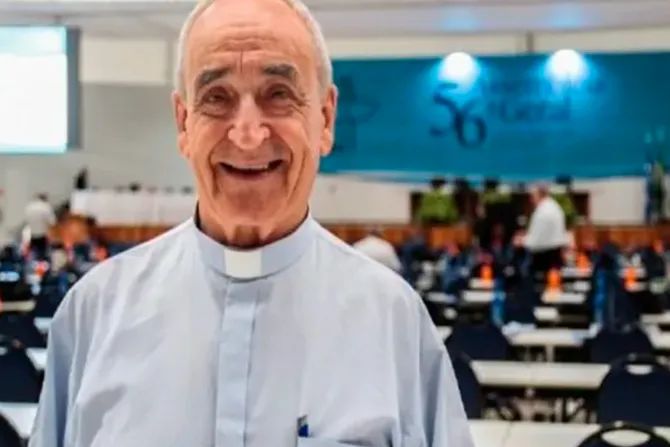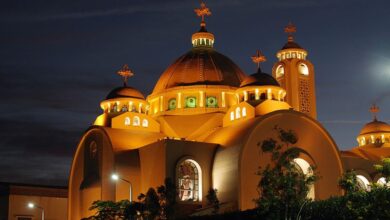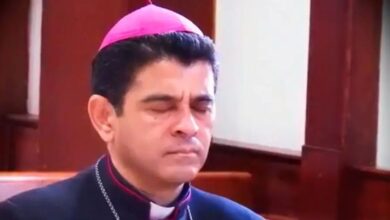Nuncio asks Brazil bishop who criticized Amazon synod to leave prelature

 Bishop Emeritus José Luis Azcona at the 56th general assembly of the CNBB in Aparecida, San Pablo, in 2018. / Credit: CNBB
Bishop Emeritus José Luis Azcona at the 56th general assembly of the CNBB in Aparecida, San Pablo, in 2018. / Credit: CNBB ACI Digital, Dec 13, 2023 / 18:00 pm (CNA).
The apostolic nuncio in Brazil, Archbishop Giambattista Diquattro, has asked Bishop Emeritus José Luis Azcona Hermoso to no longer live in the territory of the Prelature of Marajó, where he served for almost 30 years.
Azcona relayed the news to Father Kazimierz Antoni Skorki, the diocesan administrator of the prelature, who in a Dec. 9 Instagram post said the prelature had not received any notice from the nuncio nor been given any reason for the move.
The apostolic nuncio is the representative of the Holy See who serves as the ambassador of the pope in the countries that maintain diplomatic relations with the Vatican.
The Prelature of Marajó was created by Pope Pius XI on April 14, 1928. It currently encompasses nine municipalities on the island at the mouth of the Amazon River that belongs to Pará state and is a suffragan see of the Archdiocese of Belém do Pará.
Bishop José Luis Azcona was born in Pamplona, Spain, and was bishop of Marajó from 1987 to 2016. As bishop emeritus, Azcona was one of the few voices that criticized some aspects of the 2019 Amazon Synod, noted for the call to ordain married men and women deacons and the establishment of an Amazonian rite that incorporated Indigenous elements into Catholicism.
The bishop criticized the “absence of Christ Crucified” in the Instrumentum Laboris, or working document of the synod, drawing attention to the lack of the central element of proclaiming the Gospel.
The former bishop of Marajó pointed out that the working document did not address the real problems facing the region.
He also warned about the lack of mention of sin in the lives of the Indigenous peoples in the working document in addition to warning about the scandal and idolatry caused by the use of Pachamama images during Amazon Synod events.
Azcona criticized that the working document equated Christianity with other religions, denying “the uniqueness and exclusivity of Christ as the way” for the salvation of all men. “A profoundly secular vision” took hold of the Instrumentum Laboris, the bishop said in 2019.
During the synod, there was also debate about the possibility of abolishing priestly celibacy in the Amazon, alleging that abstinence is a concept that could not be understood by the Indigenous people. Azcona firmly defended the doctrine of the Church in this regard.
“The first step toward solving the problem of celibacy,” he pointed out, “is not the abolition of it. It is, on the contrary, inculturating the Gospel as the profound values, vital aspirations, anthropological roots of a certain culture. It’s not the Indigenous culture that encounters insurmountable difficulties in understanding celibacy. It’s because there was no real inculturation of the Gospel among them.”
The bishop emeritus pointed out that “it’s not an Indigenous worldview that determines evangelization and establishes what can or cannot be accepted in the Gospel of Jesus Christ.”
In 2009, Azcona denounced cases of pedophilia and sexual exploitation of children and adolescents in Marajó by local politicians and businessmen. The complaint led to a Parliamentary Investigation Commission (CPI) of pedophilia in the Legislative Assembly of Pará and in the National Congress.
According to the newspaper O Liberal de Pará, Azcona will have to leave Marajó in January, when the new bishop, José Ionilton Lisboa de Oliveira, appointed by Pope Francis at the beginning of November, takes office.
Ionilton served as vice president of the Pastoral Land Commission (CPT) beginning in 2018. In 2021 he acted as interim president of the CPT. He is also part of the Pan-Amazon Ecclesial Network (Repam Brazil), created by Pope Francis after the Synod on the Amazon.
This story was first published by ACI Digital, CNA’s Portuguese-language news partner. It has been translated and adapted by ACI Prensa/CNA.





